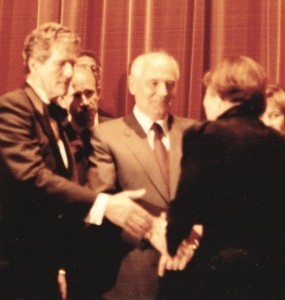Libby Fischer Hellmann's Blog, page 64
October 26, 2011
Digital Synchronicity
I wanted to expand on one of the points I made in my previous post. I'm not sure the above title is the right way to describe it – there's probably some term already in use that has nothing to do with what I'm talking about. But I haven't found a better name, so I'm going with it.
One of the happy – and unexpected – advantages of going digital with books is the production of related (or what used to be called "subsidiary") content at a very reasonable cost.
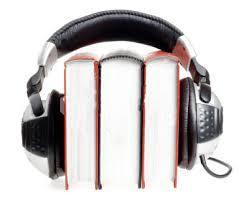 It's probably most noticeable with audiobooks. Btw, I'd really like to talk to someone who is knowledgeable about ebooks and foreign translations… in fact, if you'd like to guest post, get in touch.
It's probably most noticeable with audiobooks. Btw, I'd really like to talk to someone who is knowledgeable about ebooks and foreign translations… in fact, if you'd like to guest post, get in touch.
Back to audio –I remember longing for a company to pick up my Ellie Foreman books on audio, but being told by both my agent and my editor that the series had to be selling at a higher level to interest an audio producer. I also remember thinking that shouldn't be the case. That, just as people have a wide selection in paper books, that selection should be available in audio. I remember being told by an audio producer that it cost thousands of dollars to produce an audiobook back then (this was only about ten years ago, btw.) and I'd have to sell about 50,000 copies per title before they'd consider me.
I have a background in film and video production and used to work for a radio station. I'm not an audio producer, but I knew even then that was — er — hyperbole.
The big producers have their own studios, and after the initial construction costs, production costs are minimal. Yes, a narrator can cost a few thousand, especially if they're a "big" name, but other than that, audio is the one format that was considered affordable, even before things went digital.
Today the costs are even lower. I produced an audio of SET THE NIGHT ON FIRE over the summer with a professional narrator for about $1500. But that's not the best part – at least for authors.
Audible – Yes it's owned by Amazon – in an aggressive move to corner as much of the audio market as they can, has launched a new program for US authors. Through ACX you can list your books (you need to have the rights, and they need to approve you) that are available for audio production. There's also a database of narrators, and you can search through them, find a voice you like, and make an "offer" for that narrator to record and produce your book. There are different options as far as costs go, and different options for distribution, and yes, there's a way for you to pay nothing upfront. Yup. It can be free.
Not a bad deal.
I listed two of my books and received an offer on one within a few days. Thus, I'm happy to say that the audio of my very first Ellie Foreman book, AN EYE FOR MURDER[image error], will be recorded and available hopefully by the holidays. That will make four of my eight novels (EASY INNOCENCE and A PICTURE OF GUILT are the others) now on audio.
So far I haven't seen a similar program for book-to-film or video. But like audio, the costs for video production have come way down. How far behind can it be?
Are you listening, Netflix? I hear you need to create some good-will these days…
October 21, 2011
To E or Not to E: An Update
[image error]As most of you know, I'm a crime fiction author, both traditionally and e-published. About eighteen months ago Joe Konrath asked me to blog about the benefits of traditional publishing. I did. Then, as I started e-publishing more myself, that post developed into a presentation comparing the Pros and Cons of traditional vs. e-publishing. I've given that talk about a dozen times, and I created a handy-dandy chart on the left, which I hope you can read. (Just click on it to enlarge)
But the book business has been changing, sometimes profoundly, every few months, and now, almost two years later, some issues (not all, but some) have either changed or vanished. At the same time, new ones have emerged.
I was curious – have those changes tipped the scales in one direction or the other? Are there new markers and/or warning signs that fiction writers should know going forward? So I decided revisit the issues.
Be forewarned… this is a long post, so you might want to grab some coffee or something stronger before you read it.
Also, before I start, I want to thank Kris Rusch, Dean Wesley Smith, and Lee Allred who've graciously allowed me to "borrow" some of their information. Lee even compiled a chart that's similar to mine. I'll annotate their info as we go. Btw, I am a regular reader of their blogs and you should be too. Click on their names to get to them.
Traditional Publishing Pros
I'll start with a couple of the Pros of traditional publishing as I saw them eighteen months ago.
Support and Reviews
What I said then: If a publisher gets behind a title, you can't beat their marketing support and promotion. They saturate the media with information and hype in a way most individual authors can't. Even if you're not one of the "chosen," publishers send out ARCs for review – which I believe is still the best ways to start generating "buzz." As much as I appreciate Amazon reviews, a review from the New York Times, or NPR can make a huge difference in sales… and it's just plain hard to beat a starred review in PW Booklist or Kirkus.
What I say now: The above is still true, but with qualifications. Only a few bestseller authors are chosen for the royal treatment — often those who don't need the support. Their books are everywhere. For the rest of us, it's become even tougher. The number of books being published is down. The number of ARCs being distributed is down, and the number of traditional review sources, ie newspapers and magazines, is too. Bottom line, it's harder than ever to make a splash with your book in traditional forums.
At the same time, though, the volume of online review sources has exploded. And the number of reviewers who review self-published and/or indie authors is climbing. In addition, there are a host of websites that will feature your traditionally published novel. So it's not as if promotion and support isn't there– it's just moved online. Which is both a pro and a con. Depending on how comfortable you are with social media.
Moving on to Distribution:
What I said then: Traditional publishers' distribution networks are broad, deep, and in some cases, even creative. As much as we focus online for our book info, when you see a book in the bookstore, at the airport, in Costco, on a bus, or the grocery store, it makes an impression. The more impressions, the more apt a consumer is to buy. Publishers make those impressions possible in ways that a computer screen can't.
What I say now: That's still true. For big publishers. But Borders is no more, Barnes and Noble is cutting back, and more authors are going with mid-sized or smaller publishers whose reach is not as broad as the Big Six. Except online, where everyone is still on a level playing field, more or less. Still, distribution online just isn't the same as seeing your book in the airport when you're between flights. It just isn't.
Eighteen months ago, I also talked about the advantages of in-house editing, the role of booksellers who could hand-sell your books, and the fact that book awards are generally limited to traditionally published books. Not much has changed there, either, except that independent bookstores are closing by the handful, which makes me want to cry. And also makes hand-selling less common.
Traditional Publishing Cons
Let's go to the Cons of traditional publishing (Told you this would be long…)
They're listed on my chart, and frankly, there's nothing terribly new here. You already know about the stingy e-book royalty rates given to authors by traditional publishing (average 25% among the Big 6 ). Recently, there's been noise about raising them, which is good. Much of that noise is, coming, interestingly, from agents. (More about them later).
You probably also know you wait much longer for your book to come out (at least a year), and you only get royalty statements twice a year, although Simon & Schuster announced they will make sales info available to their authors online. It's a great idea. Let's see if other publishers follow suit.
Yes, you get money up front, but advances for most authors are much smaller these days ($10,000 is the new $50,000). Print runs are down too.
And the shelf life for a new book in print is, as Sara Paretsky has said, is somewhere "between the milk and the yogurt." You have about 6 weeks to make a splash. And then people move on to next best story.
On the "Con" side, though, new issues have emerged that traditionally published authors should know about. Much of this is what I've learned from Kris and Dean.
Contracts: Hinky things are going on with contracts these days. Limitations on what you can write and publish… what constitutes a reversion of rights… and what happens when your backlist is orphaned or goes out of print. When you're finished here, go read about some of them. It's troubling, to say the least. Kris and Dean recommend you hire a lawyer go over your contract… Don't leave it in your agent's hands. I agree.
Bankruptcy: Are publishers going under? Dorchester did. Will others follow suit? Clearly, none of us know, and we certainly can't control the process, but it's something to think about.
Accounting of e-book Royalties: Traditional publishers are still refining their systems to account for e-book sales, and there are anecdotal stories that authors are not getting all the royalties they are due. I really don't think anyone is trying to cheat anyone, but the new accounting rules are still in their infancy. Which means – well – you need to pay very close attention to your royalty statement.
Agents: Yes, agents take 15% and most traditional authors understand that. I'm happy to, btw. What I'm not so sure about is that some agents – whose revenues have been slashed by all the changes – are trying to recoup those revenues by e-publishing their clients' backlists. Should they be publishers as well as agents? How can they represent you with one hand, and publish you with the other? Isn't that a conflict of interest? It's a dilemma. The jury is still out. The Passive Voice has a series of post on agents. You need to read them.
The Passive Voice has a series of post on agents. You need to read them.
Still with me? Yeah, I know. Maybe you should go have a drink, because we're still not done.
E-Publishing Pros
As many of you already know, the biggest Pro of E-publishing is control. The writer has it, the publisher doesn't. I list it as a Pro, but I know folks who think it's a Con. Mostly these are writers who do not approach their career as a business… who don't want to be bothered by all the "money" and "process" stuff. I am a Type-A, and I want to know as much as I can, so I see self-publishing as a tremendous opportunity. Some people, like David Wilk, call it becoming the "Entrepreneurial Author." I'm there.
As far as the other Pros, nothing has really changed in the past couple of years. You don't need a middleman, and you don't need an agent. And you don't need a company (which are sprouting like mushrooms after a rain) that offers to put your books up for you… and takes a big chunk of the proceeds. You can choose the cover, the story, the editor (and yes, needs an editor). You can convert it yourself or hire someone to do it without mortgaging your future. Accounting is almost instantaneous and is 24-7. And you have the potential to make a good bit of change. Maybe even a small fortune.
I also want to mention a "new" pro that's emerged from digital technology. Suddenly it's easier to produce subsidiary content for your work. I produced an audio of SET THE NIGHT ON FIRE for much less than I thought it would cost. It will be out in time for the holidays, btw. I am also pursuing foreign rights directly for some of my novels, and they might turn out to be translations that are e-books. In fact, there seems to be an emerging synchronicity in the digital world between e-books, audio, and other digital format. That's good for all of us.
E-Publishing Cons
But let's take a closer look at the Cons, because there are some.
First, the money:
I made great money at the beginning. I was a consistent Amazon best-seller for a couple of books, which were priced at 99 cents. Then I got greedy and raised the prices to $2.99. My sales tanked, and I'm still trying to recover.
Bottom line: Just like in traditional publishing, there are ups and downs. You'll make money one week, you won't the next. But, thankfully, e-books are forever. They will never go out of print. So there are always going to be new opportunities with new readers.
There is an upfront financial outlay to do it "right"… ie professionally. Probably about $1500. Which includes editing, cover, conversion, uploading, and a couple hundred dollars for promotion.
Quality: Sorry folks, but the quality of e-books is all over the place. Gatekeepers have yet to emerge, but maybe there shouldn't be. Some people say readers are the gatekeepers… I get that. But here's the thing: Some readers aren't as discriminating as I am. They either can't tell or they don't care if a book isn't up to my standards. They're reading it for different reasons. So is that a pro or a con? I guess it depends where you stand. In many cases, indie authors outsell me 10 to 1, so who's to say?
Marketing; There's nothing really new here either. We all know we have to spend more time marketing online, in ways we never imagined. But even if you're traditionally published, you know you have to do that. Hello, Social Media.
Amazon: However, there is a new "Con" in indie publishing that I want to discuss (and then I'll let you go). And that "Con" is Amazon. Ironically, it's also the biggest "Pro" of indie publishing. Some days they're my best friend. Some days they're my worst enemy. Amazon can make me rich, Amazon can make me poor. And depending on the month, they have.
I can't blame it on an individual. An author's success on Amazon depends mostly on their algorithms, a secret formula that makes my books show up with other books as "If you have read X, you'll like Y." Being on the right list at the same time can produce a book that virtually sells itself — for months. Just ask Simon Wood, CJ Lyons, and J. Carson Black. But the opposite is true as well. I know. I've been in both places. I hear that Amazon is changing their algorithms so there will be a faster turn-over of authors. We shall see.
Still, the fact remains that Amazon is over 90% of my sales. They are essentially a monopoly. And they're getting bigger. They are gobbling up mid-list authors whom they will publish and promote, and they're increasing their co-op promotion – I talked about that earlier — it's similar to what used to exist in bookstores. As Amazon gets bigger, individual authors matter less. That's just the way it is. I don't see much of a solution… yet.
So… wrapping it all up, here's my updated Pros and Cons chart. Yeah, I know it's smaller… I hope you can read it. What do you think? Btw, for those of you who've made it this far… I salute you. Have at it. What did I miss?[image error]
Oh… and stay tuned. Six months from now, things will likely be very different.
And just in case you're wondering, I self-published two books this year as e-books. But my next book, a literary thriller set in Iran due out next April, will be traditionally published by one of the best of the new, niche publishers, Allium Press of Chicago.
And so it goes.
October 19, 2011
Help for Special Needs Kids — and Their Parents
 A very different post today. But just as important as the ones before.
A very different post today. But just as important as the ones before.
A good friend of mine who lives in the UK just published a wonderful resource for parents of Special Needs Kids. The UK educational system isn't that different from ours, at least in Chicago, in terms of what hoops you need to jump through to get your kids the help they need (and where it is she tells you). For that reason I thought having Tania Tirraoro talk about her own experience might be helpful for parents of Asberger's and autistic kids — no matter where you live. Having had similar journeys through the public school system, I wish I'd had the support from someone like Tania. Here she is.
I remember the day my younger son received his diagnosis of Asperger Syndrome. I drove home from the hospital with him in the back, aged six, tears streaming down my face wondering what the future would hold for him. All the dreams I had had for him seemed irrelevant; this was a whole new ball game. There was no point dreaming about the future—he needed me to think about what to do to help him today.
He is the most wonderful boy, bright, interesting and a completely original thinker. I was determined that his diagnosis would not change the way I saw him although it did make sense of a lot of questions we had about his difficulties and his lack of response when you spoke to him. It wasn't that he hadn't heard, he just thought the answer in his head and assumed you'd heard it too.
I decided the best way to help him was to get informed, fast and find the educational support that was appropriate for him. His school at the time set various interventions in place – such as giving him a special workspace, charts for helping his organisation and so on. But while those things improved his school experience, he did not seem to be making any progress educationally.
In the UK, we have a graduated system of support culminating in something called a "statement of special educational needs" – this is a legal document that sets out the support a child needs and how it is to be provided. Great idea, you may think – and it is. The trouble is, convincing your local education department to give you one in the first place. It costs them money that they would rather not spend.
For me, as a journalist, researching, writing a report on my child and gathering evidence was not easy, but do-able. Then I got to thinking about all those parents whose children also had great difficulties but did not have the same skills I had to access the right help.
I started a website called http://www.specialneedsjungle.co.uk to help them and now I've published a book, currently in eformat as well as paperback, extending that help. It shows parents how to find the evidence they need and how to write their application for an assessment of their child. I know from feedback from my site that there is a huge need for this.
If you're not UK based, your system will be different, but if you are faced with having to prove your child's needs to get the help they need, you may find the book useful as a guide. I have deliberately priced it at a less expensive price than most of the SEN books out there—it's for parents, after all, who are probably already facing the financial squeeze from the recession and from providing for their child's needs.
My son and his older brother, with whom we later went through the same process with as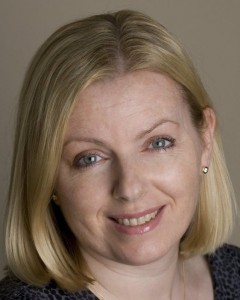 well, are both now progressing well in the right educational environment. I'm lucky to have been able to help them get it. I hope this book will help others do the same for their children.
well, are both now progressing well in the right educational environment. I'm lucky to have been able to help them get it. I hope this book will help others do the same for their children.
Special Educational Needs – Getting started with statements is available at Amazon.co.uk | Amazon.com | Smashwords
Tania's websites and blogs are at http://www.specialneedsjungle.co.uk
http://www.tirraoro.com and http://notasadvertised.blogspot.com
Now, let's hear from you. For those who've had to maneuver through a school system to get help for your kids, what are some tips for the rest of us?
October 15, 2011
Predictions: E-books and Publishers and Amazon
First off, I'm not a prognosticator or guru. As a traditionally published and indie author, I straddle both sides of the fence, but I have no academic or other credentials from which to predict the future of ebooks and publishing. But occasionally I do like to take the long view and try to make sense of the chaos around me. So I'm going to stick my neck out and make a few observations. They're entirely subjective and unscientific, and if they don't come to pass, you can have lots of fun telling me how wrong I was.
First off, Amazon.
As we know, Amazon is the 800 pound gorilla in the room. Somedays they're my best friend, other days my worst enemy. And I'm just an author. Imagine what publishers think about the Big A. Amazon is their key distributor; at the same time, with their growing number of imprints, Amazon may well become their key competitor. Given that, the big question is whether booksellers, some of whom say they'll never stock an Amazon book, will eventually capitulate. I think they will and we will see Amazon books in bookstores, Costco, Walmart, etc. But in order for that to happen, Amazon will have to give up something.
Royalty Rates
And that leads me to my second prediction. There is a growing consensus among writers and agents that the 25% ebook royalty rate the Big 6 (and other) publishers offer their authors is highway robbery. I'm firmly in that camp, btw. I think 25% is way too low. Something has to give. So here's what I think. Amazon will raise their royalty rate to publishers from 70% to 80%. Not for indie authors, you understand, just for "certified" (in some way), bonafide" publishers. Publishers will then raise their e-book royalty rate for their authors to 35% or 40% of net. (Which is about what Amazon currently offers their new stable of authors). In return, the Big 6 will drop their resistance to Amazon entering the bookstore market, and presto — Amazon books will be sold side-by-side Harper Collins, Penguin, and St. Martin. Whether this happens in a formalized way or whether it just becomes a quid pro quo, I don't know. But I think it will happen.
Co-op
There's one more part to this prediction, btw, which stems from the complaint that the quality of indie books is sub-standard. Much of it is, and Amazon is already dealing with that by sponsoring periodic promotions of traditional publishers' books. These promotions are the bane of the indie author. Amazon's power to direct hordes of buyers to the books being promoted instead of indie authors' work means indie sales usually drop during the promotion period. I know mine do.
Well, welcome to the new world of co-op, fellow authors. This is exactly what happened at B&N and Borders in the last decade. "Big" books were prominently featured on tables near the front of the stores, while midlist authors' books languished in the stacks. And I predict Amazon will launch more of these promotions going forward. It's a way for them to theoretically control quality without further alienating publishers. So if you're not with a publisher, gird yourself. It's going to be a bumpy ride.
On the 99 cent price
I keep hearing that Amazon wants to raise their prices on books and get rid of the 99 cent book. I don't think that's going to happen. Amazon makes twice as much from 3 books selling at 99 cents (about $1.93) than from 1 book that sells at $2.99 (about .99 cents). Why would they give that up? I think there will always be an Amazon market at .99 cents. The question is whether authors want to price their work that low.
Finally, a couple of other observations.
I think more authors will band together to brand themselves in this new market. I'm a member of the Top Suspense group, and we'll be publishing our second anthology soon. There's also a group called Backlist E-Books, and a group of horror/sci fi authors just announced their presence. I think that will continue, as authors try to stake out territory in the new e-verse.
I also think more authors will sell books from their own websites and platforms.
And I'm not sure enhanced e-books are going to be the next, best thing. We're already sufiiciently ADD'd by all the distractions and links (including mine) that undermine our concentration and sometimes seem just randomly thrown in because they can be. I just don't see videos and interviews and other gizmos being a big part of literature, especially if they drive up the price of ebooks. But I might be wrong. There's an interesting article (Thank You, Passive Voice) about this here. (Yeah, I tried to wait till the end to insert links.)
So what do you think? Let's talk.
October 10, 2011
What the Dutch think about hard-boiled American fiction…
I am delighted to have Dutch author Jochem Van der Steen as my first guest blogger. Jochem has a terrific blog, Sons of Spade which is devoted to hardboiled crime fiction. I just discovered he is also the founder of the Hardboiled Collective, a group of like-minded hardboiled crime writers, including Timothy Hallinan, Bill Crider and Bruce DeSilva. One of Jochem's protagonists, Noah Milano, appears in Thrills, Kills 'n' Chills with a new short story, War Crimes . Another story, Tough As Leather, is reviewed at Murderous Musings and more of Jochem's work is listed below.
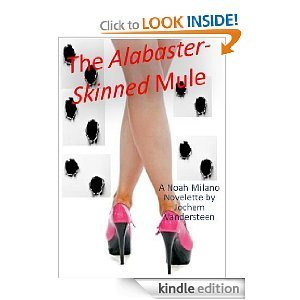
I asked Jochem to talk about what the Dutch think about hard-boiled American crime fiction. I was surprised — and fascinated — by his response. I think you will be, too.
I am honored to be on Libby's blog. She asked me to give you some insight into what we in Holland think about American crime fiction, since I'm a Dutch writer.
American crime is not the most popular crime these days. Sure, Karin Slaughter sells like crazy and David Baldacci and Harlan Coben do well, but don't they everywhere? No, what's popular over here is the "literary thriller''. Often they tend to be tedious novels about women wrestling with some dark secret or a stalker. Scandinavian crime fiction does really well these days, even before it did well in the rest of the world. Elizabeth George (American, of course, but writing like she was British) and Nicci French are also bestsellers.
See the similarities? Not really hardboiled crime fiction, right? Generally hardboiled fiction is looked at as pulp, fiction maybe to be read by men, but certainly not women. Unfortunately women make up 80% of the thriller reading audience over here. Imagine, even Michael Connelly is not a bestseller here.
If Dutch people think about American crime they think CSI, NCIS, Law & Order. Glitzy, Hollywood crime shows. Not excellent, gritty work people like James Lee Burke and Andrew Vachss put out. It's a shame, because they might have the tendency to look down at that genre, but they're missing out on thrillers that are a hell of a lot more psychological than a lot of the stuff they are buying.
I was lucky to encounter my first Dutch translation of a few novels by James Lee Burke, Robert B. Parker and John MacDonald twenty years ago, when they were available. It hooked me on the hardboiled genre and soon, when translations weren't to be found anymore due to the lack of popularity, I started to buy the original US-versions. They influenced me enough to create my own protagonists: Noah Milano (ex-mob fixer turned security specialist looking for redemption) and Mike Dalmas (husband, father, vigilante). Because I knew they wouldn't be popular here I decided to write in English. I was lucky, the e-zines in the US liked them and soon my heroes found an audience that would have been impossible in Holland.
So, if you're an American author and you're not published in the Netherlands, don't worry. It's not about the quality. It's just a matter of taste.
Check out The Albaster-skinned Mule (A Noah Milano Novelette) 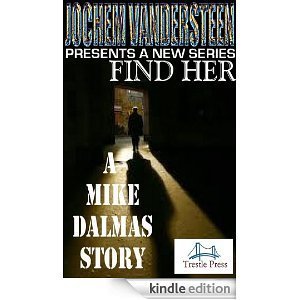
Find Her (A Mike Dalmas Digital Short), if you want to find out more about what I can't sell in my own country 
PS Libby here… Please do check out Jochem's work. And thanks so much, Jochem, for posting on SAY THE WORD!
PPS Comments or questions? Shoot!
October 7, 2011
Still Star-Struck After All These Years
One of the nice things about being an author is that people don't usually recognize you when you break out of the cage and go outside. Which means I can wear sweats, my hair can be a mess, my socks mismatched, and no one cares (except my Mother). I like that anonymity. In fact, I crave it. I think part of it comes from the fact that I grew up in Washington, DC, where gossiping about the neighbors meant you were talking politics. Seeing a boring senator or congressman, even a President, wasn't a big deal, especially when I used to roll Easter eggs on the White House lawn with Mamie.
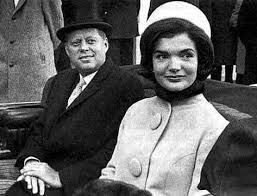 President Kennedy changed all that. I was only 10 when he was elected, but even I knew something was different. He was handsome and witty, his wife gorgeous and sophisticated. They both had IT. Charisma. I often think that was the beginning of DC's metamorphosis from a sleepy southern swamp to something more polished and metropolitan.
President Kennedy changed all that. I was only 10 when he was elected, but even I knew something was different. He was handsome and witty, his wife gorgeous and sophisticated. They both had IT. Charisma. I often think that was the beginning of DC's metamorphosis from a sleepy southern swamp to something more polished and metropolitan.
The Kennedy charisma was addictive, and I inhaled it. And over the years looked for more. Although I don't want to be one, I'm just as star-struck as the next person. There's something about being close to the glamour, the fame, and the glitz that's seductive. I want to touch it. See if it's real. There was even a trending topic on Twitter a while back about peoples' anecdotes when brushing up against celebrities.
So, I thought I'd recap some of my brushes with the stars. Since a lot of you wanted to know about my "conversation" with Beatle George Harrison, especially after that awesome Martin Scorcese HBO documentary the other night, I'll start there.
[image error]
I was 14 when the Beatles came to DC for a concert. I discovered they were staying at the Shoreham Hotel, which was only one block from my house. On top of that, it was a snowy February day, and school was dismissed early. I rushed to the Shoreham with a friend, who just happened to know someone who lived on the hotel's 7th floor. Along with 100 other screaming girls, we watched the Beatles climb out of their limo and hurry into the elevator. Then we hot-footed it to another set of elevators to the 7th floor. Imagine our shock when we ran into a cop in the hall! That clinched it. It was karma. The Beatles had to be staying on the 7th floor! While my friend tried to explain to the cop that we really were visiting her friend, I ran down the hall to the first set of elevators. Sure enough, a minute later the Fab Four emerged. I shoved a piece of paper at George Harrison, and he said five words that I have remembered the rest of my life: "Do you have a pencil?"
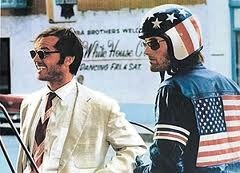
Next: I was working in my first job at WRC-TV in DC the summer of '69. Peter Fonda and Dennis Hopper had just released Easy Rider, and Jack Nicholson ("nick-nick") came to the radio station to do an interview. We were in the middle of producing a local documentary about "Washington's youth," so I ran down to the basement where he was interviewing and asked if he'd do an interview for us. He said sure, and that night we went to a disco with film crews, lights, etc. During the course of the evening, he asked if I'd go back to his hotel room with him. I said five words I may regret for the rest of my life: "Sorry, I have a curfew."
Next: Years later I was producing a fundraising video for Hugh O'Brian –the original TV Wyatt Earp. He created a youth foundation, HOBY, that is still active today. If you know Hugh, you know he doesn't take no for an answer, and by some miracle, he'd managed to snag Former Premier Mikhail Gorbachov of the USSR to be the guest of honor for a fundraising banquet. I got to shoot video of the event.
OK, yes he's a politician, but, like Kennedy, Gorbachov had charisma. I confess a little "thrill went up my leg" when I shook his hand. And I have the picture to prove it (That's me with my back to the camera).
[image error]Finally a few years ago, I went to a Women's Business networking conference. I got there about a half hour early and walked into the luncheon hall to read the paper. There, sitting in a corner all by herself, looking incredibly beautiful, was Gloria Steinem. I sucked in a breath. I really wanted to talk to her, but I didn't want to invade her privacy. Happily, she looked up, smiled, so I screwed up my courage and went over. We ended up chatting for about 10 minutes. I was gobsmacked.
Funny that the people we admire seem to change over time. What about you? What brushes with celebrities do you hold dear? Do any seem silly now?
P.S. Just to get back to books, TOXICITY was featured on E-Reader News Today this week, and for one brief, shining moment, it was #2 on Amazon's Bestseller Hard-boiled Thriller list! If you haven't bought it yet, why not get it through ENT? Just click here.
P.P.S. A prior version of this originally appeared on The Lipstick Chronicles a while ago.
September 30, 2011
Backstory…

Paul at Wrigley Field, August, 2011
I never thought I'd be starting my own blog. For over five years, I was part of the Outfit Collective, and I was happy. But times change. And the Beatles claim that if you say the word, you'll be free. Don't believe them? Click on the cover of Rubber Soul.
Add to that the fact that George Harrison said five words to me, and Paul played at a party I attended—well, okay, it was Wrigley Field and a few other people were there, too—nonetheless, I'm a believer.
So here I am. And so are you. I probably don't need to tell you what we'll be doing. You know. But I'll say it anyway. No matter what we share… or how we tell our stories… we use words. And when we choose the right ones, the most expressive ones, we are free.
I'm going to try and do that, and I hope you'll join me. Rant, review, rave, analyze, tell me YOUR stories and news. Please. Otherwise it will be pretty lonely over here. I'll start… with the back story to my latest novel, TOXICITY.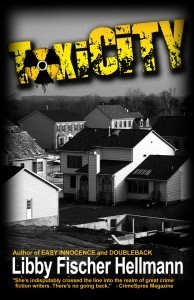
A funny thing happened on my way to publishing this novel.
I published seven others before it. Btw, for those of you who don't have a clue who I am, I usually introduce myself as the best author you've never heard of. I've published eight crime novels and number nine will be out next spring. I'm a hybrid – I've published both traditionally and independently.
In fact, TOXICITY is the first novel I've ever self-published. But it wasn't the first novel I wrote. It was the third. Back then, though, self-publishing wasn't a viable option. So, after I finished my second novel (the first will remain forever in the trunk collecting dust), I sent out lots of query letters and managed to snag an agent. A New York agent. With a reputable agency. You can imagine my joy. And my confidence. I was pretty hot stuff.
The agent tried to sell that second novel for six months. Unfortunately, he didn't succeed. But by then I'd written a sequel (the novel that became TOXICITY). So when he called to say he didn't think he could sell my novel, I replied cheerfully.
"That's okay," I chirped. "I've written a sequel. And it's MUCH better. Sharper prose, more complex plot. Stronger characters."
"I don't think you understand," he replied. "I don't think I can sell a book with these characters. I think you need to change them. And change your plot. And your voice. Your agent, too, because I don't want to represent you anymore."
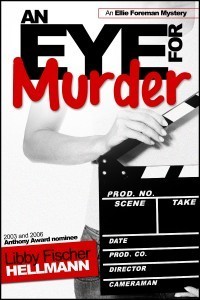 After a few bottles of wine and a lot of tears, I eventually picked myself up off the floor and followed his advice. The fourth book I wrote, AN EYE FOR MURDER, featured a brand new protagonist, Ellie Foreman, and became my first published novel. With a new agent. I went on to write three more books in that series.
After a few bottles of wine and a lot of tears, I eventually picked myself up off the floor and followed his advice. The fourth book I wrote, AN EYE FOR MURDER, featured a brand new protagonist, Ellie Foreman, and became my first published novel. With a new agent. I went on to write three more books in that series.
But the characters in the books that were rejected still haunted me. Characters like Georgia Davis, Ricki Feldman, and Matt Singer. So I cannibalized them. Especially Georgia. She and Ricki Feldman made their first "official" appearance in AN IMAGE OF DEATH, one of the Ellie books. Then Georgia had her own series. Ricki came back and so did Matt in EASY INNOCENCE.
Bringing them back was the kiss of death for the earlier books, I thought. Until I was procrastinating one day (I do that a lot) and started re-reading that third book. The story wasn't half bad, I realized. It needed polishing. Rewriting. Updating. But maybe… just maybe… I could bring it out as a prequel.
So I eliminated 20,000 words. Changed the title. Got it edited. And published it on Kindle, Nook, and Smashwords.
The moral? There may be something to getting fired by your agent.
February 1, 2011
Two Sixties Stories
I lived in Georgetown in DC during what I now call “The Summer of My Discontent.” I shared an apartment with four other people above a movie theater at 28th and M. (Both are gone now). I was working at an underground newspaper, selling them on the streets, and generally trying to make sense of the world. Next door to the movie theater was a head shop run by a weird – but sweet — guy named Bobby. He wore black all the time, before there were Goths. The scent of Patchouli oil hung in the air.
I used to drop in every once in a while. Often two of his friends, Donna and Linda, would be there. They were a couple: Linda had long brown hair and appeared to be kind of spacey. Donna had short blond hair and wore a leather jacket, even in July. They were cool in the way everyone was cool back then, and we’d smoke a joint, laugh a lot, and discuss what a strange place the world was becoming. Then, around August, they disappeared. After not seeing them for a week or so, I asked Bobby where they went. He hemmed and hawed and wouldn’t tell me. Finally, he did.
Donna used to be Don, he said. And was going through the process of becoming a woman, but hadn’t completed it when she met Linda. They fell in love, and because of that, they jointly (no pun intended) agreed that Donna should turn back into Don. So they hustled some money from someone and were off to California to reverse Donna’s transformation.
I never saw them again. But I still think about them.
The other story is more political. As I said, I worked at an underground newspaper in DC for a summer. I was just a flunkie, not even considered staff. But there was a photographer, Sal, who was in and out all the time. He took photos at every demonstration, interview, and event that could be considered “alternative.” I actually had a crush on him at one point. (Yes, I know. Very bourgeois).
At any rate, the editor of the newspaper was cautious about trusting people, almost to the point of paranoia. He always thought the paper was being infiltrated by CIA or FBI types (these were the days before COINTELPRO proved the FBI was indeed infiltrating radical groups). At the time, I thought his paranoia was exaggerated. Triggered perhaps by an inflated sense of self-importance.
I left at the end of the summer to hitchhike across country (That’s a different story), but I heard a few months later that Sal had left too, and was off to Paris. He stayed there for a while, then disappeared. I never knew what happened to him. Then, about a month ago, well after I finished the thriller, I Googled some of the people from the newspaper. Suddenly a photo of Sal popped up. It turns out he had been featured in SECRETS: THE CIA'S WAR AT HOME by Angus MacKenzie.
Yup. You guessed it. Sal had been a CIA agent, recruited when he was in college in Chicago. The entire time he was taking photos for the paper, he was reporting to his CIA handler. Eventually, I think the editor suspected him. Maybe he even confronted him, which precipitated his abrupt departure.
It doesn’t end there. According to MacKenzie’s book, Sal went to Paris, befriended Philip Agee, himself a former CIA agent turned whistleblower, and fiddled around with the typewriter on which Agee was writing his story. Agee discovered it, and Sal fled. From what I understand he changed his name and now lives in Southern California.
True stories. Really. I mean, who could make this stuff up?

